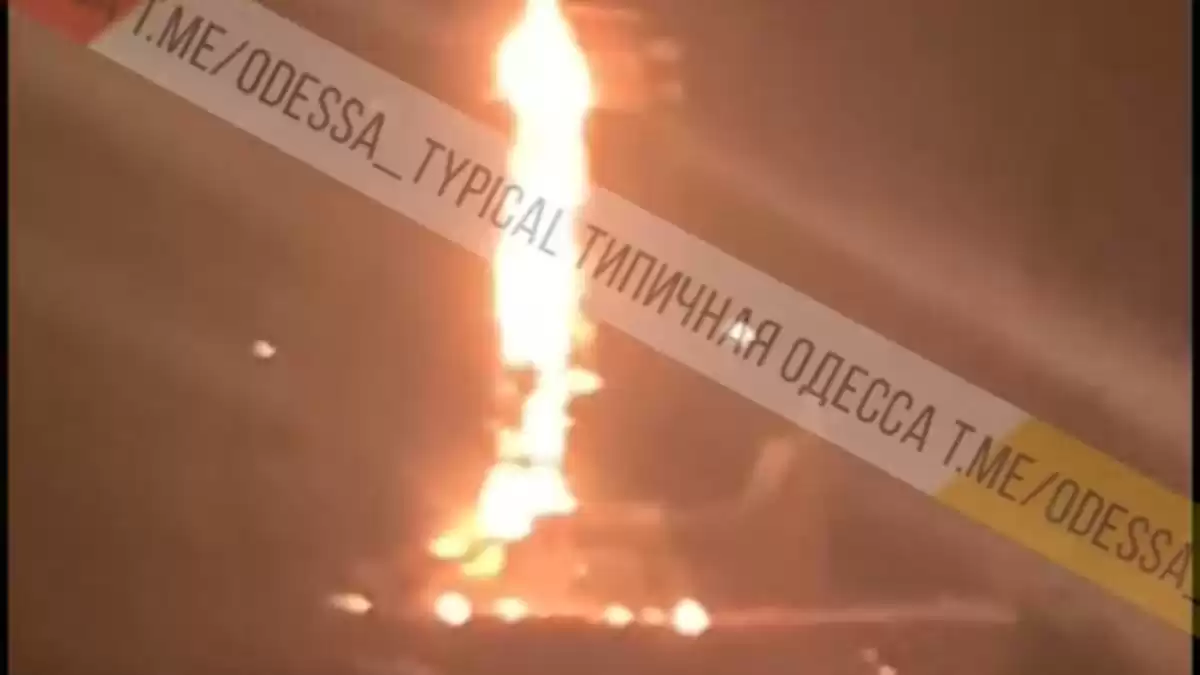Putin's Yom Kippur onslaught: Ukraine's Odessa faces devastating consequences
Russia launches powerful missile attack on Ukraine's port city of Odessa, coinciding with Yom Kippur and targeting a hotel.
Russia has launched a powerful missile attack on the port city of Odessa in Ukraine. The attack occurred during the holy day of Yom Kippur, when many of Odessa's large Jewish population were marking the end of their fasting period. The Russian invaders targeted the Hotel Odessa, which is used as a military training center, and local reports indicate that the building is now engulfed in flames. The attack lasted for over an hour and involved a barrage of shahed missiles, along with other weaponry such as Onyx and Calibers.
Oleg Veretskiy, who posted on X (formerly known as Twitter), described the attack as one of the most intense and dense assaults on Odessa in a long time. He mentioned that the explosions were loud and occurred near his location, but fortunately, he and others survived. The air raid alert has been canceled.
This attack on Odessa comes as part of President Vladimir Putin's ongoing illegal invasion of Ukraine, which has now entered its 20th month. Despite the prolonged conflict, there is no visible sign of victory for Russia. In fact, just days before this missile strike, Russian air strikes killed two people and injured three others in Ukraine's Kherson province. The city of Beryslav has been repeatedly targeted, resulting in the destruction of private houses and the loss of civilian lives.
The Kherson region, where these attacks are taking place, is located in the Ukrainian-controlled part of the province. The Dnieper River, which runs through the region, has become a battle line since Russian forces retreated across it in November 2022. The retreat boosted the morale of the Ukrainian forces, who have since retaken the city of Kherson from Russian occupation.
In another front-line region, Donetsk, the Russian-installed authorities have imposed restrictions on the occupied areas. These include a curfew, a ban on rallies or protests, and military censorship of all correspondence, online messages, and phone conversations. The extent and implementation of this censorship are yet to be determined.
Meanwhile, in Russia, a Ukrainian drone struck an administrative building in the city of Kursk, causing minor damage to the roof. Reports suggest that the building housed the offices of the Kursk branch of Russia's main security agency, the Federal Security Service (FSB). The Kursk region, which shares a border with Ukraine, has been a frequent target of attacks.
As these events unfold, Ukrainian President Volodymyr Zelensky is returning from North America, where he addressed the UN General Assembly and made his first war-time visit to Canada. During his trip, he stopped in Poland to award state honors to two Polish volunteers. Although he did not meet with Polish officials, Zelensky expressed gratitude for Poland's support and solidarity in defending the freedom of Europe.
However, tensions have arisen between Ukraine and Poland due to a trade dispute. Ukraine filed a complaint with the World Trade Organization against Poland, Hungary, and Slovakia for banning imports of Ukrainian farm products. These products are crucial for Ukraine's economy, which has been severely affected by the ongoing conflict. The response from the European Union member nations has been defensive, with Polish Prime Minister Mateusz Morawiecki stating that his country is no longer transferring weapons to Ukraine and is instead arming itself with modern weapons.
These recent developments raise questions about the level of Western support for Ukraine in its war with Russia. Despite the challenges and uncertainties, the people of Ukraine continue to endure the devastating consequences of the conflict, hoping for a resolution and lasting peace.











Comments on Putin's Yom Kippur onslaught: Ukraine's Odessa faces devastating consequences